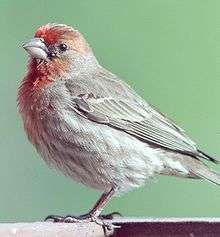American rosefinch
The American rosefinches that form the genus Haemorhous, are a group of passerine birds in the finch family Fringillidae. As the name implies ("haemo" means "blood" in Greek), various shades of red are characteristic plumage colors of this group. They are found throughout the North American continent.
| American rosefinches | |
|---|---|
 | |
| House finch (Haemorhous mexicanus) | |
| Scientific classification | |
| Kingdom: | Animalia |
| Phylum: | Chordata |
| Class: | Aves |
| Order: | Passeriformes |
| Family: | Fringillidae |
| Subfamily: | Carduelinae |
| Genus: | Haemorhous Swainson, 1837 |
| Species | |
|
See text | |
The genus is not closely related to the Carpodacus rosefinches that are found in Europe and Asia.[1][2]
Systematics
There have been a number of rosefinch radiations. One of the first to split off were the ancestors of the North American species and diverged in the Middle Miocene (about 14–12 mya) from the proto-rosefinches.[3]
Species
The genus contains three species:[1][4]
| Image | Scientific name | Common Name | Distribution |
|---|---|---|---|
.jpg) | Haemorhous cassinii | Cassin's finch | western North America as far south as northern New Mexico and Arizona; also Southern California near Baja California. |
 | Haemorhous purpureus | Purple finch | Canada and the northeastern United States |
.jpg) | Haemorhous mexicanus | House finch | North America from southern Canada to the Mexican state of Oaxaca |
gollark: What do this "J P Morgan and friends" have to do with this?
gollark: Zapping yourself with high voltage seems like a *completely* reasonable way to cure illnesses!
gollark: Except 1487. That was real.
gollark: They would have needed telephones to do telekinesis.
gollark: That's ridiculous. They faked gravity before telephones were a thing.
References
- Chesser, R. Terry; Banks, Richard C.; Barker, F. Keith (2012). "Fifty-third Supplement to the American Ornithologists' Union Check-list of North American Birds" (PDF). The Auk. 129 (3): 573–588. doi:10.1525/auk.2012.129.3.573. Retrieved 2012-07-18.
- Zuccon, Dario; Prŷs-Jones, Robert; Rasmussen, Pamela C.; Ericson, Per G.P. (2012). "The phylogenetic relationships and generic limits of finches (Fringillidae)" (PDF). Molecular Phylogenetics and Evolution. 62 (2): 581–596. doi:10.1016/j.ympev.2011.10.002. PMID 22023825.
- Banks, Richard C.; Browning, M. Ralph (July 1995). "Comments on the Status of Revived Old Names for Some North American Birds" (PDF). The Auk. Berkeley, California: University of California Press. 112 (3): 633–648. JSTOR 4088679.
- Gill, Frank; Donsker, David (eds.). "Finches, euphonias". World Bird List Version 5.2. International Ornithologists' Union. Retrieved 5 June 2015.
This article is issued from Wikipedia. The text is licensed under Creative Commons - Attribution - Sharealike. Additional terms may apply for the media files.